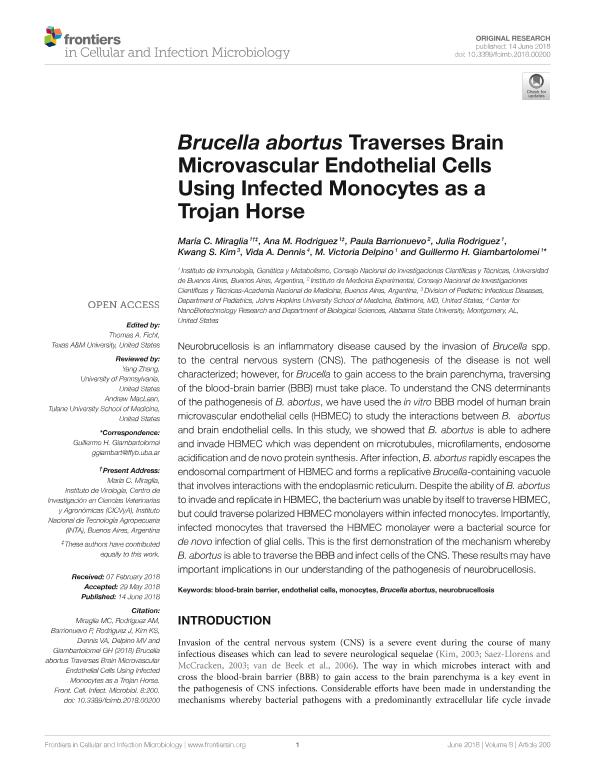Artículo
Brucella abortus traverses brain microvascular endothelial cells using infected monocytes as a Trojan horse
Miraglia, Maria Cruz ; Rodríguez, Ana María
; Rodríguez, Ana María ; Barrionuevo, Paula
; Barrionuevo, Paula ; Rodríguez, Julia
; Rodríguez, Julia ; Kim, Kwang S.; Dennis, Vida A.; Delpino, María Victoria
; Kim, Kwang S.; Dennis, Vida A.; Delpino, María Victoria ; Giambartolomei, Guillermo Hernan
; Giambartolomei, Guillermo Hernan
 ; Rodríguez, Ana María
; Rodríguez, Ana María ; Barrionuevo, Paula
; Barrionuevo, Paula ; Rodríguez, Julia
; Rodríguez, Julia ; Kim, Kwang S.; Dennis, Vida A.; Delpino, María Victoria
; Kim, Kwang S.; Dennis, Vida A.; Delpino, María Victoria ; Giambartolomei, Guillermo Hernan
; Giambartolomei, Guillermo Hernan
Fecha de publicación:
06/2018
Editorial:
Frontiers Media S.A.
Revista:
Frontiers in Cellular and Infection Microbiology
ISSN:
2235-2988
Idioma:
Inglés
Tipo de recurso:
Artículo publicado
Clasificación temática:
Resumen
Neurobrucellosis is an inflammatory disease caused by the invasion of Brucella spp. to the central nervous system (CNS). The pathogenesis of the disease is not well characterized; however, for Brucella to gain access to the brain parenchyma, traversing of the blood-brain barrier (BBB) must take place. To understand the CNS determinants of the pathogenesis of B. abortus, we have used the in vitro BBB model of human brain microvascular endothelial cells (HBMEC) to study the interactions between B. abortus and brain endothelial cells. In this study, we showed that B. abortus is able to adhere and invade HBMEC which was dependent on microtubules, microfilaments, endosome acidification and de novo protein synthesis. After infection, B. abortus rapidly escapes the endosomal compartment of HBMEC and forms a replicative Brucella-containing vacuole that involves interactions with the endoplasmic reticulum. Despite the ability of B. abortus to invade and replicate in HBMEC, the bacterium was unable by itself to traverse HBMEC, but could traverse polarized HBMEC monolayers within infected monocytes. Importantly, infected monocytes that traversed the HBMEC monolayer were a bacterial source for de novo infection of glial cells. This is the first demonstration of the mechanism whereby B. abortus is able to traverse the BBB and infect cells of the CNS. These results may have important implications in our understanding of the pathogenesis of neurobrucellosis.
Archivos asociados
Licencia
Identificadores
Colecciones
Articulos(IMEX)
Articulos de INST.DE MEDICINA EXPERIMENTAL
Articulos de INST.DE MEDICINA EXPERIMENTAL
Articulos(INIGEM)
Articulos de INSTITUTO DE INMUNOLOGIA, GENETICA Y METABOLISMO
Articulos de INSTITUTO DE INMUNOLOGIA, GENETICA Y METABOLISMO
Articulos(SEDE CENTRAL)
Articulos de SEDE CENTRAL
Articulos de SEDE CENTRAL
Citación
Miraglia, Maria Cruz; Rodríguez, Ana María; Barrionuevo, Paula; Rodríguez, Julia; Kim, Kwang S.; et al.; Brucella abortus traverses brain microvascular endothelial cells using infected monocytes as a Trojan horse; Frontiers Media S.A.; Frontiers in Cellular and Infection Microbiology; 8; 6-2018; 1-11
Compartir
Altmétricas



